Watchen Nyanue Is Making Space For Black Women To Climb The Ladder Of Success On Their Own Terms
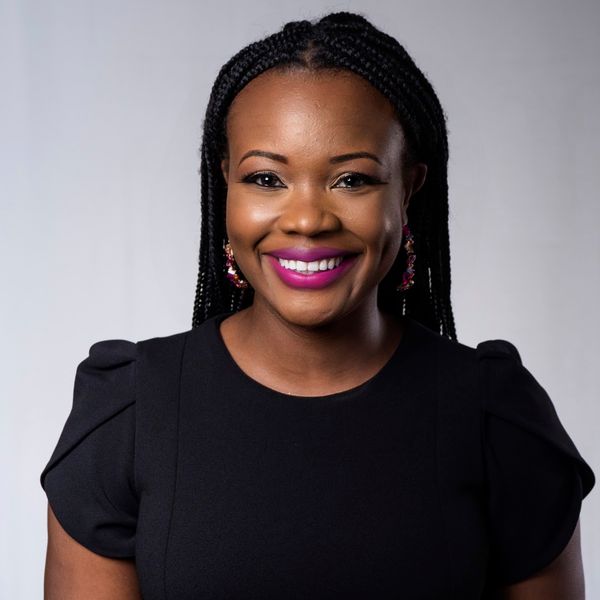
The ability to advocate for oneself can be one of the greatest tools in our arsenal of personal and professional growth. For Black women in the corporate world, specifically, this is a unique rite of passage earned through speaking up on your behalf for promotions, negotiating salaries, or even overcoming workplace bias and discrimination. This process, though challenging, can reveal to us the inner voice that will serve as both a guide and champion for our upward mobility. Thankfully, women like Watchen Nyanue, founder and CEO of I Choose the Ladder, are creating space for Black women to find their voice in the workplace to climb the ladder of success on their own terms.
Watchen grew up in Liberia during a time of civil war and national unrest. From the ages of six to eight, she watched as her country was tugged between war and peace, exposing her to the worst of what the world could be, and ultimately reshaping her views on fear. "I think living through that trauma gave me an appreciation for life, but it took fear away from me. Life can be very fleeting, so I always tell myself, 'Why not just try it?'"
After her family emigrated to the US, music and television served as a guide for who Watchen saw herself becoming. Unlike most traditional immigrant households where becoming a doctor or lawyer is revered, Watchen's parents gave her the license to discover her passions and explore her skills outside of these trades. "My dad is an engineer, and because he understood what it took to become that, he would say, 'Go find what you want to do and be the best at that.'"
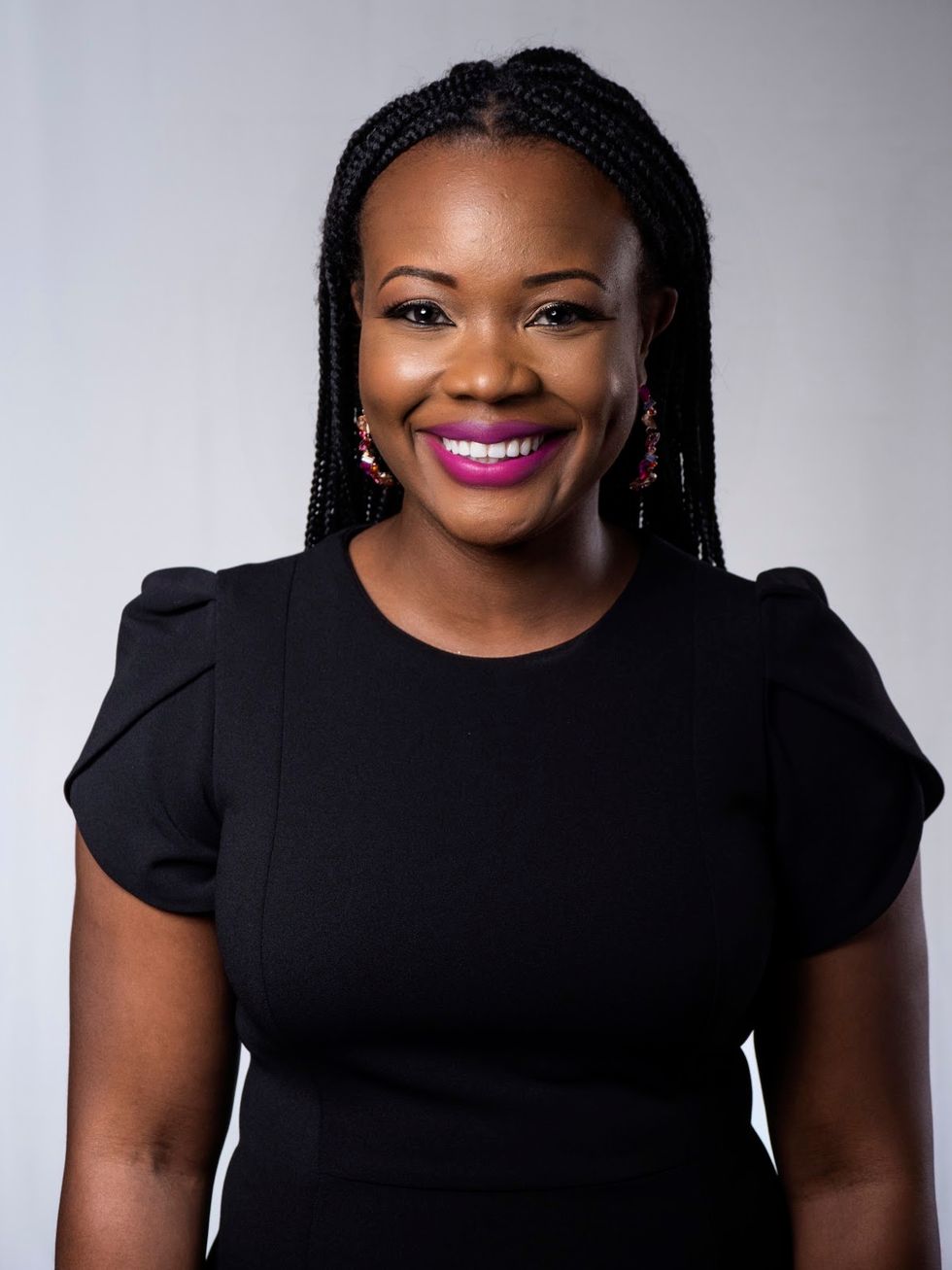
Courtesy of Watchen Nyanue
This freedom to explore granted Watchen the space to gain clarity on the purpose of her work and the legacy she would shape in the long run to impact women like her. Because of her tenacity and the relationships she built along the way, Watchen has a resume that extends from companies like Comedy Central, Johnson Publishing Company, and now serves as the Senior Vice President of the WNBA, Chicago Sky; one of the youngest Black women to hold that position.
Today, Watchen applies the wisdom she's gained in her professional career to her work as the founder of the career summit, The Climb, and career consulting company, I Choose The Ladder, which bridge the gap between ambitious Black women and the corporate elevation that awaits them.
"I love us for real. If you get us in position to win, we're always going to make sure that we all win."
On reshaping the Women’s Empowerment/Conference space and launching the Climb Summit.
"For me, I tend to create what I need. If I need it, there are probably other people who need it too. There was a level of frustration that came with conferences. I'd receive all this information, but I don't know what the first step was to do with it. At the I Climb Summit, we take away all the fluff. We make sure we're intentional about the women who are leading and teaching and make sure they identify as Black women and feel comfortable talking about their journey as Black women because the challenges that we face are very unique to us. We don't need to see the highlight reel, we need to pull back the curtain a bit to show what it's really going to take to succeed."
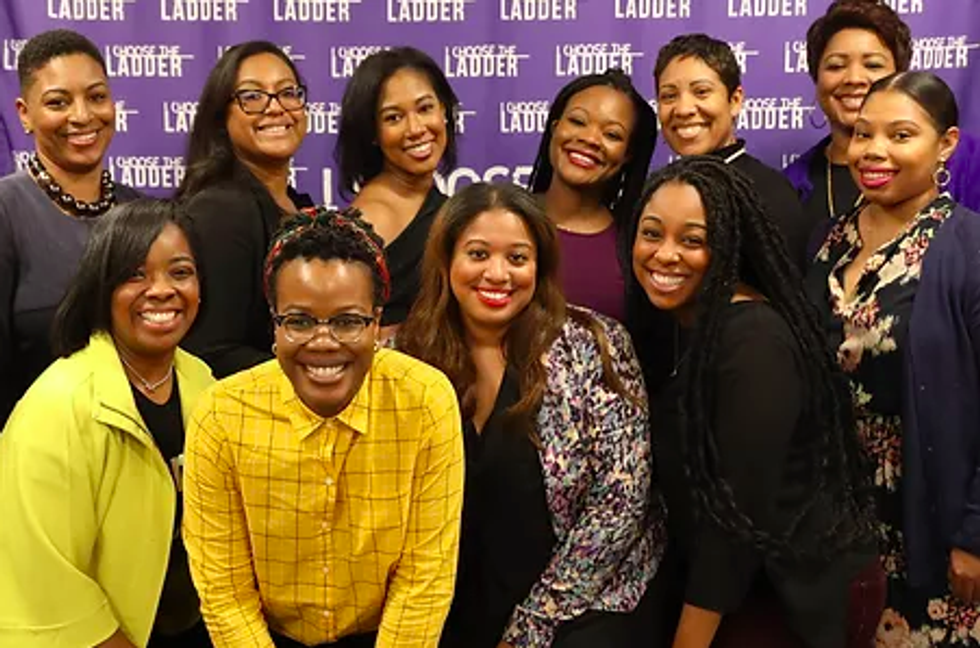
Courtesy of Watchen Nyanue
"We don't need to see the highlight reel, we need to pull back the curtain a bit to show what it's really going to take to succeed."
On giving Black women the tools to advocate for themselves in the workplace.
"We launched our latest product, The Review Planner, because I feel like our annual reviews don't always get maximized. For me, it's always been about keeping receipts and having clarity around how my success is being measured. The planner helps you track your progress all year long so when it's time for your performance review, it's not your manager telling you what they think you did or you telling them what you remember, it's actual data that backs you up. It's your job to bring to their attention how much of a boss you are and what you bring to the table. If you don't find ways to infuse that into conversation with your managers, they may never know."
On how to navigate spaces when you’re the “only” in the room.
"My goal with I Choose the Ladder isn't to convince Black women to leave corporate, it's to make sure that once you do, you leave with as much as you gave. There's a price we pay to be in these spaces, so we need to make sure we're getting the benefits, which can't just be our title or salary because those things can be easily taken away.
"If you plan to be senior in any industry, most of the time, you're going to be the 'only'. But perspective matters: what do you want to get from the people in these rooms? Yes, it's going to be tough, but what reward do you want to receive for having to pay that price? Be very strategic about how you spend your time in these spaces."
"There's a price we pay to be in these spaces, so we need to make sure we're getting the benefits, which can't just be our title or salary because those things can be easily taken away."
On strategic networking and the power of building organic relationships.
"I have a solid squad of mentors and sponsors and everyone that I have, I found doing work -- whether on a committee or volunteering my time. So when they say 'be organic', don't put yourself in spaces because you have an ulterior motive. When you are engaged in the things that you care about, you tend to work harder, people see you as your best self, and you naturally gravitate towards each other.
"Another thing is, I have a natural curiosity about people; people are interesting. Ask folks about themselves, the books they're reading, the art in their office. It doesn't always have to be career advice. Figuring out your intercepting points of interest can take a lot of the pressure off and be a jumping-off point for a conversation that can lead to a relationship."
"When you are engaged in the things that you care about, you tend to work harder, people see you as your best self, and you naturally gravitate towards each other."
On denouncing shame around unemployment and how to pivot during a pandemic.
"If you're in this economy and find yourself unemployed, underemployed or just doing what you need to do to pay your bills, there's no shame in that. Give yourself some grace; it takes time to pivot. You can't control that you got laid off or if a company hires you. What you can control is how prepared you are for your interviews, how intentional you are about growing your network, and how much work you're putting into yourself to develop new skills for when, not if, that new role comes."
On the one piece of advice that shaped her the most in your career.
"Most of the things we fear never happen. And sometimes we don't try things because of fear of the unknown. Whenever I'm feeling uncertain about a decision, I do an exercise called, 'What if? What is?' I write out all my 'what if's' and in the 'what is' column, I balance it out with what's true. By the time you reach the end, you'll see that you've already handled a version of what you're afraid of. I tell people all the time that you have all that you need right now to do what you need, right now. Just trust the process."
To connect with Watchen, follow her endeavors on Instagram @ichoosetheladder, and tune into her podcast, I Choose the Ladder.
Featured image courtesy of Watchen Nyanue
Because We Are Still IT, Girl: It Girl 100 Returns
Last year, when our xoNecole team dropped our inaugural It Girl 100 honoree list, the world felt, ahem, a bit brighter.
It was March 2024, and we still had a Black woman as the Vice President of the United States. DEI rollbacks weren’t being tossed around like confetti. And more than 300,000 Black women were still gainfully employed in the workforce.
Though that was just nineteen months ago, things were different. Perhaps the world then felt more receptive to our light as Black women.
At the time, we launched It Girl 100 to spotlight the huge motion we were making as dope, GenZennial Black women leaving our mark on culture. The girls were on the rise, flourishing, drinking their water, minding their business, leading companies, and learning to do it all softly, in rest. We wanted to celebrate that momentum—because we love that for us.
So, we handpicked one hundred It Girls who embody that palpable It Factor moving through us as young Black women, the kind of motion lighting up the world both IRL and across the internet.
It Girl 100 became xoNecole’s most successful program, with the hashtag organically reaching more than forty million impressions on Instagram in just twenty-four hours. Yes, it caught on like wildfire because we celebrated some of the most brilliant and influential GenZennial women of color setting trends and shaping culture. But more than that, it resonated because the women we celebrated felt seen.
Many were already known in their industries for keeping this generation fly and lit, but rarely received recognition or flowers. It Girl 100 became a safe space to be uplifted, and for us as Black women to bask in what felt like an era of our brilliance, beauty, and boundless influence on full display.
And then, almost overnight, it was as if the rug was pulled from under us as Black women, as the It Girls of the world.
Our much-needed, much-deserved season of ease and soft living quickly metamorphosed into a time of self-preservation and survival. Our motion and economic progression seemed strategically slowed, our light under siege.
The air feels heavier now. The headlines colder. Our Black girl magic is being picked apart and politicized for simply existing.
With that climate shift, as we prepare to launch our second annual It Girl 100 honoree list, our team has had to dig deep on the purpose and intention behind this year’s list. Knowing the spirit of It Girl 100 is about motion, sauce, strides, and progression, how do we celebrate amid uncertainty and collective grief when the juice feels like it is being squeezed out of us?
As we wrestled with that question, we were reminded that this tension isn’t new. Black women have always had to find joy in the midst of struggle, to create light even in the darkest corners. We have carried the weight of scrutiny for generations, expected to be strong, to serve, to smile through the sting. But this moment feels different. It feels deeply personal.
We are living at the intersection of liberation and backlash. We are learning to take off our capes, to say no when we are tired, to embrace softness without apology.
And somehow, the world has found new ways to punish us for it.

In lifestyle, women like Kayla Nicole and Ayesha Curry have been ridiculed for daring to choose themselves. Tracee Ellis Ross was labeled bitter for speaking her truth about love. Meghan Markle, still, cannot breathe without critique.
In politics, Kamala Harris, Letitia James, and Jasmine Crockett are dragged through the mud for standing tall in rooms not built for them.
In sports, Angel Reese, Coco Gauff, and Taylor Townsend have been reminded that even excellence will not shield you from racism or judgment.

In business, visionaries like Diarrha N’Diaye-Mbaye and Melissa Butler are fighting to keep their dreams alive in an economy that too often forgets us first.
Even our icons, Beyoncé, Serena, and SZA, have faced criticism simply for evolving beyond the boxes society tried to keep them in.
From everyday women to cultural phenoms, the pattern is the same. Our light is being tested.

And yet, somehow, through it all, we are still showing up as that girl, and that deserves to be celebrated.
Because while the world debates our worth, we keep raising our value. And that proof is all around us.
This year alone, Naomi Osaka returned from motherhood and mental health challenges to reach the semifinals of the US Open. A’ja Wilson claimed another MVP, reminding us that beauty and dominance can coexist. Brandy and Monica are snatching our edges on tour. Kahlana Barfield Brown sold out her new line in the face of a retailer that had been canceled. And Melissa Butler’s company, The Lip Bar, is projecting a forty percent surge in sales.

We are no longer defining strength by how much pain we can endure. We are defining it by the unbreakable light we continue to radiate.
We are the women walking our daily steps and also continuing to run solid businesses. We are growing in love, taking solo trips, laughing until it hurts, raising babies and ideas, drinking our green juice, and praying our peace back into existence.
We are rediscovering the joy of rest and realizing that softness is not weakness, it is strategy.
And through it all, we continue to lift one another. Emma Grede is creating seats at the table. Valeisha Butterfield has started a fund for jobless Black women. Arian Simone is leading in media with fearless conviction. We are pouring into each other in ways the world rarely sees but always feels.

So yes, we are in the midst of societal warfare. Yes, we are being tested. Yes, we are facing economic strain, political targeting, and public scrutiny. But even war cannot dim a light that is divinely ours.
And we are still shining.
And we are still softening.
And we are still creating.
And we are still It.

That is the quiet magic of Black womanhood, our ability to hold both truth and triumph in the same breath, to say yes, and to life’s contradictions.
It is no coincidence that this year, as SheaMoisture embraces the message “Yes, And,” they stand beside us as partners in celebrating this class of It Girls. Because that phrase, those two simple words, capture the very essence of this moment.
Yes, we are tired. And we are still rising.
Yes, we are questioned. And we are the answer.
Yes, we are bruised. And we are still beautiful.

This year’s It Girl 100 is more than a list. It is a love letter to every Black woman who dares to live out loud in a world that would rather she whisper. This year’s class is living proof of “Yes, And,” women who are finding ways to thrive and to heal, to build and to rest, to lead and to love, all at once.
It is proof that our joy is not naive, our success not accidental. It is the reminder that our light has never needed permission.
So without further ado, we celebrate the It Girl 100 Class of 2025–2026.
We celebrate the millions of us who keep doing it with grace, grit, and glory.
Because despite it all, we still shine.
Because we are still her.
Because we are still IT, girl.
Meet all 100 women shaping culture in the It Girl 100 Class of 2025. View the complete list of honorees here.
Featured image by xoStaff
Give Thanks: 10 Tips For Hosting An Absolutely Awesome Friendsgiving
If you’ve never checked out an episode of the ReLiving Single Podcast featuring Maxine and Synclaire — oops, I mean Erika Alexander and Kim Coles — it’s worth listening to an episode or two; especially if you’re someone like me who watches the Living Single reruns on TV One, sometimes, like they just came out. Good times.
And what does this even remotely have to do with Friendsgiving? Well, if you ever wondered what the origin story of this non-holiday-holiday is, legend has it that it’s mostly due to the combination of a 2007 tweet and the show that tries to act like it wasn’t birthed out of Living Single: Friends (I’m not the only one who feels this way either; you can read more about all of that here, here and here).
Apparently, there was a Thanksgiving episode that featured all of the friends having dinner together. And y’all, there was simply no way that I was going to mention the latter without shouting out the original (amen?).
Okay, so with that out of the way — Friendsgiving. Something that I appreciate about twists to holidays like this is that it’s a reminder that there is no one way to celebrate special occasions. And so, if, for whatever the reason, you will not or cannot be with family during the holiday season, there are certainly other alternatives at your disposal.
That being said, if the thought of spending time with friends this Thanksgiving is something that you’d like to do, yet you’re not sure how to host it in a way that will make Friendsgiving a fan favorite for your entire circle — I’ve got 10 suggestions that can make the planning process easy as pumpkin (or sweet potato) pie.
1. Position Chrysanthemums or Orchids for Your Table Décor
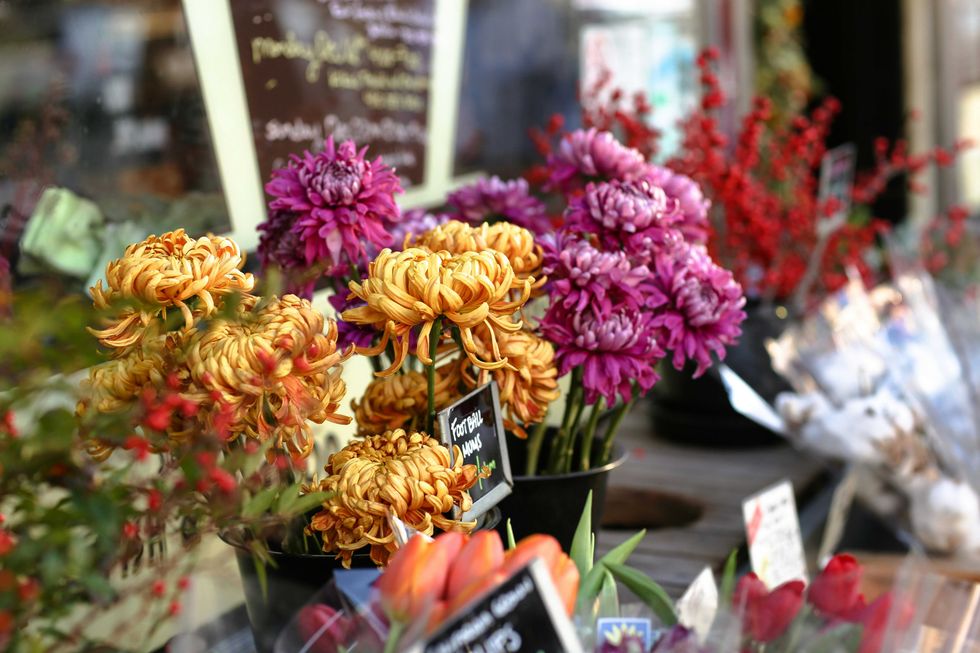
Unsplash
Let’s start with décor first. Listen, aside from cleaning up your place, you don’t have to be over the top. If you put together a really nice centerpiece or put a flower at each table setting, honestly, you’re all good. And if you’re someone who is big on details and symbolism, my recommendation would be to go with some chrysanthemums and/or orchids.
When it comes to chrysanthemums, not only are they a peak fall flower, they represent things like friendship and happiness. And orchids? They tend to bloom during the fall and spring seasons and, not only are they about luxury, certain orchid colors also symbolize friendship (for the record, yellow roses symbolize friendship too). Perfect.
2. Incorporate Scents That Cultivate Gratitude
Speaking of cultivating a warm and inviting space, you can never go wrong with scented soy candles — or at least having an essential oil diffuser in a few spots. Some scents that actually help to bring in the spirit of gratitude include vanilla, jasmine, ginger, cedarwood and frankincense.
3. Use Upscale Paper Products to Dine With
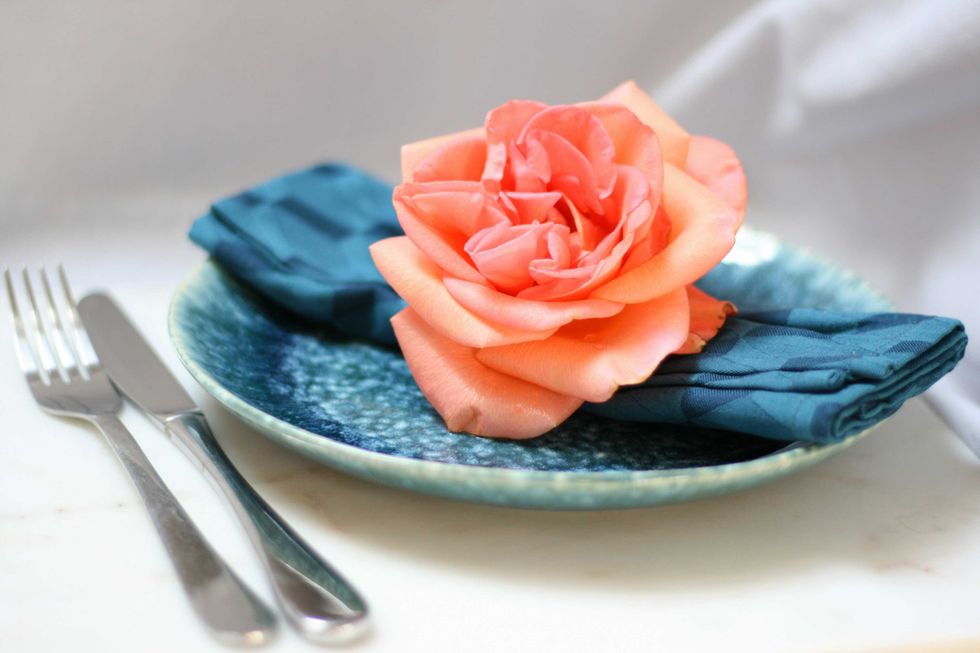
Unsplash
Let’s be real — a lot more of us would probably host events in our home if it wasn’t for the mess that is left behind in our kitchen once the festivities are over. Wanna avoid that? Use paper plates. No, I don’t mean the cheap Styrofoam ones. SMDH. These days, there are paper (and plastic) plate brands that will low-key blow your mind when it comes to how bougie they look. Some that are worth considering are located here, here and here.
4. Handwrite Thank-You Notes (Use Them As Place Settings)
If you’re like Tiffany (from the HBO series Insecure — what a time) was at that memorable dinner party when all hell broke loose between Lawrence and Issa and you’re pretty anal — I mean, particular — LOL — about place settings, it’s a nice touch to pick up some blank thank-you cards that you can write a personalized “I’m thankful for you because…” message in. Place each one where you’d like each friend to sit. They won’t see it coming and it’s a really nice touch.
5. Have Everyone Bring Their Favorite Homemade Dish

Unsplash
Okay, and what if what has you on the fence about hosting is you don’t feel like doing a ton of cooking? Chile, this is where the concept of having a potluck comes in. Get everyone to bring the dish that they claim they cook the best and make sure to let them know how many individuals you plan on coming (so that they will make enough). You can even make a game out of it by having everyone anonymously vote for the first, second and third best dishes out of the bunch. Take it up a notch by having a prize for each winner.
6. Take a Warm Drink and Dessert Poll Beforehand
You know what isn’t discussed enough about dinner parties? Folks bringing desserts that other people don’t even like. SMDH. You can avoid this from becoming an issue at your Friendsgiving by sending an email (most people prefer that to group chats; let’s be real — and make sure to BCC everyone as well) asking everyone to share what their top three favorite desserts and warm drinks are. Then pick the top 2-3 out of the bunch. That way, you won’t have a ton of (for instance) coffee cake or apple cider lying around that no one even wanted in the first place.
7. Create a Signature Friendsgiving Mocktail and Cocktail

Unsplash
Speaking of drinks, another way to make your Friendsgiving memorable is to come up with a signature mocktail (for those who don’t consume alcohol) and cocktail. For the mocktail, you can also poll your friends about their favorite mocktail or fruits and come up with a mixture of your own. For the cocktail — although National Friendship Day is actually in August, I did peep that there are certain drinks that have been created in its honor. Some of them are located here for you to do a bit of tweaking on (if you’d like).
8. Ask Everyone to Share Their “Favorite Friend Quality” of Another
You know how it’s customary for everyone to go around and share what they are truly thankful for before having dinner? Well, to continue along with the Friendsgiving theme, have each person share what their favorite friend quality is about the person to their right. If folks are just meeting each other for the first time, instead they can share what they value the most in friendship overall, along with a story of how it was displayed to them personally over the past 12 months.
9. Send Each of Your Guests Home with a Fresh Gratitude Journal
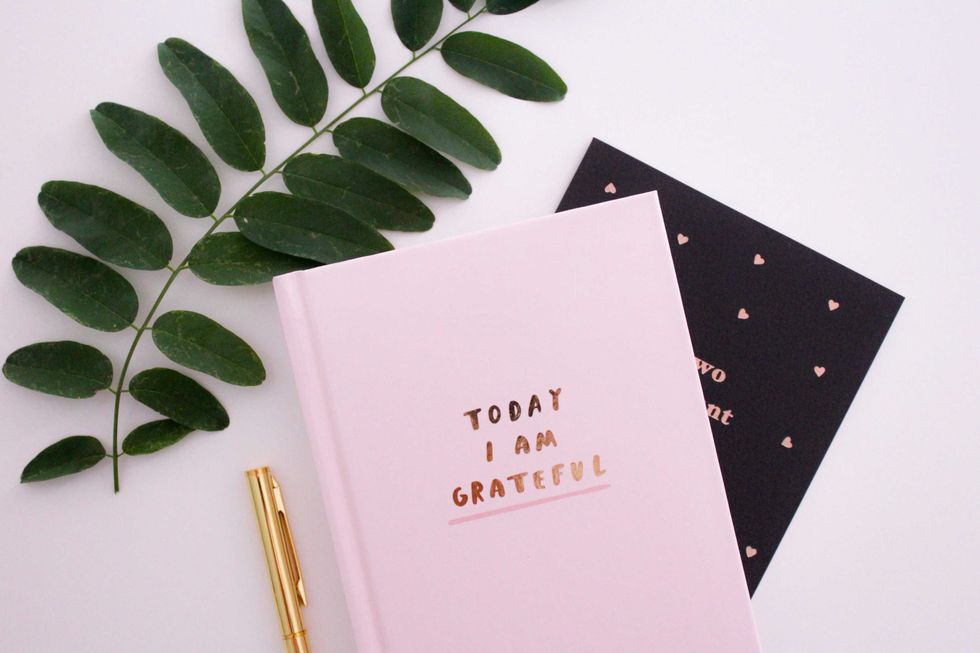
Unsplash
Wanna send folks home with a nice parting gift? It would be so on-trend to give each of them a gratitude journal. Listen, we are in some crazy times right through here (at least in the States) and so, encouraging your friends to set some time aside, regularly, to think about and then outwardly express what they are grateful for? That helps to keep stress down, keep things in perspective and it reminds us all to maintain a positive mindset as much as possible.
10. Watch a Nostalgic Movie
While everyone is enjoying dessert and drinks, how about watching a movie that brings back fond memories? A list of some of the most popular movies to come out previous Thanksgiving weekends is located here and a list of some favorite Black holiday-themed films can be found here. It’s a way to wind down and share some laughs before everyone heads home.
___
Friendsgiving. What a wonderful way to celebrate your friends while also observing Thanksgiving in a way that is totally on your terms. And now that you know how to put it together, what are you waiting for? Hit your friends up and let them know that, whether it’s on actual Thanksgiving Day or a few days before or after, you’ve got a special dinner in mind.
One that has a good time with amazing friends written ALL over it.
Let’s make things inbox official! Sign up for the xoNecole newsletter for love, wellness, career, and exclusive content delivered straight to your inbox.
Featured image by PeopleImages/Shutterstock









